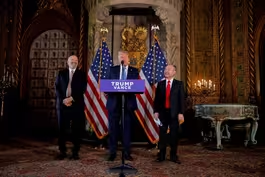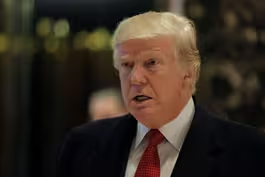
Tamara Keith and Amy Walter on Trump preparing for Day 1
Clip: 12/16/2024 | 10m 17sVideo has Closed Captions
Tamara Keith and Amy Walter on how Trump's team is preparing for his Day 1 agenda
NPR’s Tamara Keith and Amy Walter of the Cook Political Report with Amy Walter join Geoff Bennett to discuss the latest political news, including President-elect Trump's Cabinet picks meeting with senators on Capitol Hill, how Trump's team is preparing for his “Day 1” agenda and what the public is expecting from his second term.
Problems playing video? | Closed Captioning Feedback
Problems playing video? | Closed Captioning Feedback
Major corporate funding for the PBS News Hour is provided by BDO, BNSF, Consumer Cellular, American Cruise Lines, and Raymond James. Funding for the PBS NewsHour Weekend is provided by...

Tamara Keith and Amy Walter on Trump preparing for Day 1
Clip: 12/16/2024 | 10m 17sVideo has Closed Captions
NPR’s Tamara Keith and Amy Walter of the Cook Political Report with Amy Walter join Geoff Bennett to discuss the latest political news, including President-elect Trump's Cabinet picks meeting with senators on Capitol Hill, how Trump's team is preparing for his “Day 1” agenda and what the public is expecting from his second term.
Problems playing video? | Closed Captioning Feedback
How to Watch PBS News Hour
PBS News Hour is available to stream on pbs.org and the free PBS App, available on iPhone, Apple TV, Android TV, Android smartphones, Amazon Fire TV, Amazon Fire Tablet, Roku, Samsung Smart TV, and Vizio.
Providing Support for PBS.org
Learn Moreabout PBS online sponsorshipGEOFF BENNETT: With five weeks until the inauguration, Donald Trump's Cabinet picks have been meeting with senators on Capitol Hill and his team has been preparing Mr. Trump's day one agenda.
For more on that, we turn now to our Politics Monday duo.
That is Amy Walter of The Cook Political Report With Amy Walter and Tamara Keith of NPR.
It's good to see you both.
TAMARA KEITH, National Public Radio: Good to be here.
AMY WALTER, The Cook Political Report: Hello.
GEOFF BENNETT: So Mr. Trump's nominees have been on Capitol Hill trying to woo senators.
RFK Jr. was there today, in fact.
And as that was happening, president-elect Trump was in Mar-a-Lago speaking to reporters and he said that he believes RFK Jr., if he's confirmed, will be much less radical than you would think.
We will, I guess, see about that.
But, Tam, bring us up to speed on where these nominees stand, both in the perspective of the Trump transition and the Republican senators that they have been meeting with.
TAMARA KEITH: Right.
So these nominees have been making the rounds.
That's very standard.
Like, some things are very normal.
And making the rounds, going around to different senators, trying to answer their concerns is a thing that happens every time there's a new nominee.
What is different is that senators, Republican senators, do have concerns with some of these nominees.
They aren't necessarily voicing them publicly as much as perhaps you might think, in part because there's not a lot to be gained from that.
And so they are talking a lot about wanting these nominees to have a fair hearing, and having a confirmation hearing, having a fair hearing.
I think that what we don't know yet is, what are those hearings going to be like?
And are any of these candidates going to take all of these questions that they're getting and realize, oh, this is all going to be out in public later?
And I think, by and large, we expect Trump is going to get the Cabinet that he wants, but maybe not the entire Cabinet that he wants.
And someone like RFK Jr. is a really interesting case, because he is pro-choice.
And that is something that Republicans could have concerns with.
We haven't seen a massive lobbying effort on that yet from conservative groups, but it could happen.
We definitely saw Mitch McConnell come out and say, polio is real and the polio vaccine saves lives.
So you're seeing just hints of pushback.
GEOFF BENNETT: And, Amy, there's this question, what do the American people make of all of this?
And there's a new AP/NORC poll that shows 55 percent of those polled lack confidence in Donald Trump's ability to assemble a qualified Cabinet.
Just 27 percent of the public are extremely or very confident in Donald Trump's ability to appoint well-qualified individuals to his Cabinet and other high-level positions, which is fairly remarkable.
The same voting public that delivered him the Electoral College and the popular vote then turns around and says, we have no confidence in his ability to put together a well-qualified Cabinet?
What is that about?
AMY WALTER: Yes.
So I do think we have to be careful in the wording sometimes of polling.
And what I also like to do is go back and look at time series of polls.
So CNN came out with their poll asking a similar question, but phrasing it maybe a little bit differently, basically just saying, do you approve or disapprove of the way that they're handling the transition?
And they have these numbers going all the way back to Bill Clinton in 1992.
A couple of things that you can see.
The first is his approval of how he's handling it is much lower than any other president who has come in their first term.
Now, this is odd because it's his first term.
It's not his first term, right?
So non-consecutive terms, we don't have any history with that.
So we have seen people like, for example, Barack Obama coming in with an approval in the 80s in terms of how he's handling his transition.
What is different, though, from the first Trump, Trump 1.0, is that he's getting much higher marks this time around.
So, right after the election in 2017, he was only getting 46 percent approving.
By the time we got to January, only 40 percent approved.
Right now, he's at 55 percent approved, 45 percent disapprove.
And I think a lot of it is based on what Tam just said, which is it feels very normal.
It didn't feel normal in 2017.
Nothing was normal in 2017.
So the sort of rolling this out, it looks very familiar.
And I also think Tam's exactly right, is that, while there seems to be some cushion here for Donald Trump and the focus has been all on Republicans, who's going to say yes, are these folks going to get through, I think we have to remember that we have no idea how voters are going to react once they see these people themselves, once Democrats -- remember, right now, they're just meeting with the Republicans - - when Democrats get to ask questions too.
And the response of voters to like, oh, I didn't -- huh, I didn't really know about a lot of this.
That's going to be critically important.
GEOFF BENNETT: Tam, I heard you reporting on NPR last week about the differences between Trump 1.0 and Trump 2.0, let's call it, the first administration and the second one as it takes shape.
What are the fundamental differences in how he and his team are approaching this administration?
TAMARA KEITH: The first time around, they were really in a lot of ways flying by the seat of their pants.
They were figuring it out as they went.
They didn't know where the light switches were in the White House.
I mean, that's not exactly right.
But they were figuring it out.
It took about a week until they came out with the ban, the first effort at a travel ban, keeping President Trump's promise, a travel ban for people from seven Muslim-majority countries.
It was immediate chaos, immediate chaos at the airports.
Department of Homeland Security officials didn't know what they were supposed to be enforcing.
It took effect immediately, the executive order.
Lawyers at the government didn't know what they were defending.
And, ultimately, it was thrown out by the courts.
It took almost six months to actually have that in place.
Well, they have learned.
They have spent the last four years -- some of the people who will now be in this administration have spent the last four years planning for what they would do if they were back in the White House.
And they have written executive orders.
They know how to pull the levers of government in a way they didn't before.
And I think Trump is also different.
He's coming in more confident.
He knows he doesn't have that much time.
He's immediately a lame-duck.
He's not running again.
So he has a narrow margin in the House and the Senate.
He doesn't have much time.
And they intend to -- they talked about shock and awe last time.
Now Stephen Miller, the aide to -- he will be an adviser, deputy chief of staff.
He's saying it will be like a bolt of lightning.
GEOFF BENNETT: The fact that Donald Trump is a lame-duck, how does that change the dynamic, and the fact that the American electorate is now used to him?
He's a known quantity.
AMY WALTER: That's right.
And that is a really important development, because we look to the first midterm election as a really good marker for, how is the public judging this new president?
And it becomes important too, because then that president read just kind of on the fly after the results of that election.
If you're Donald Trump, like, whether Republicans gain or lose seats in the House and the Senate really isn't impacting your future legacy.
What will influence his legacy is, I think, exactly right, what's going to happen in these first two years and his ability -- I think the thing that is more likely to get in his way than control of Congress or people even within his own party rejecting him, is the courts, because so many of these things are going to end up being handled by the courts.
TAMARA KEITH: I mean, we could see him issue an executive order taking away birthright citizenship.
Now, that's in the Constitution.
But that doesn't mean that they won't try, they won't test it and try to get it to the courts.
I mean, in fact, in many cases, the court is the goal.
AMY WALTER: Yes.
GEOFF BENNETT: And there's also the question of job performance, right?
And I raise that because Donald Trump gave an interview to "TIME" magazine where he was talking about grocery prices.
And he says: "It's hard to bring things down once they're up.
It's very hard."
And we know he's attuned to this issue because here's what he told "Meet the Press' in an interview last Sunday.
DONALD TRUMP, Former President of the United States (R) and Current U.S. President-Elect: I'm looking to get -- bring prices down.
Because, you know, I won on two things, the border and more than immigration.
You know, they like to say immigration, I break it down more to the border, but I won on the border, and I won on groceries.
Very simple word, groceries.
GEOFF BENNETT: And, of course, when he was campaigning, he was basically saying, elect me and prices will come tumbling down.
It's the difference between campaigning and now and governing.
How might Democrats make this a liability for him?
AMY WALTER: Yes, well, as the Biden administration learned and Democrats learned, the president doesn't have control over the price of stuff, and prices are not come coming down.
Even as inflation goes down, prices do not change.
We're never going to go back to the 2020 cost of these grocery items.
What we're already seeing, though, in the data is that Democrats are much more pessimistic about the economy, even though nothing has changed in the last month, just looking at how they felt about the economy October and now, Republicans much more optimistic.
Where independents SIT is going to be really critical to watch.
Right now, they're a little more optimistic, but not as dramatically optimistic.
I think if you are Democrats, the number one thing you're looking at is not just to the prices come down, but what's the priority for Republicans?
The fact that, legislatively, they have got these tax cuts, you have Donald Trump on record saying, yes, we will do more cuts for corporations and wealthy individuals, that's going to be a challenge for Republicans to message.
GEOFF BENNETT: Amy Walter and Tamara Keith, our thanks to you both, as always.
AMY WALTER: You're welcome.
TAMARA KEITH: You're welcome.
Arizona farmers forced to adapt as water source dries up
Video has Closed Captions
Clip: 12/16/2024 | 6m 25s | Arizona farmers forced to adapt as main water source dries up (6m 25s)
City home to Syria's uprising celebrates life without Assad
Video has Closed Captions
Clip: 12/16/2024 | 6m 53s | City that fostered Syria's uprising celebrates life without Assad (6m 53s)
How CEOs are trying to gain favor with Trump
Video has Closed Captions
Clip: 12/16/2024 | 5m 40s | How CEOs of major companies are trying to gain favor with Trump (5m 40s)
Syrian leaders face decisions as they chart path for country
Video has Closed Captions
Clip: 12/16/2024 | 4m 54s | Syria's rebel leaders face critical decisions as they chart new path for the country (4m 54s)
Trump settlement with ABC raises press freedom concerns
Video has Closed Captions
Clip: 12/16/2024 | 7m 22s | ABC News settlement with Trump raises concerns about press freedom in his 2nd term (7m 22s)
Wisconsin shooting leaves community shaken by gun violence
Video has Closed Captions
Clip: 12/16/2024 | 2m 52s | Wisconsin school shooting leaves another American community shaken by gun violence (2m 52s)
Providing Support for PBS.org
Learn Moreabout PBS online sponsorship
- News and Public Affairs

FRONTLINE is investigative journalism that questions, explains and changes our world.

- News and Public Affairs

Amanpour and Company features conversations with leaders and decision makers.












Support for PBS provided by:
Major corporate funding for the PBS News Hour is provided by BDO, BNSF, Consumer Cellular, American Cruise Lines, and Raymond James. Funding for the PBS NewsHour Weekend is provided by...





